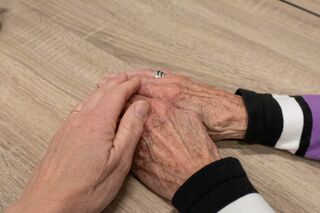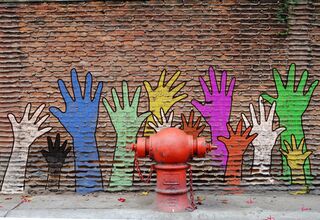Health
Post-Pandemic Health Requires Emotional and Tangible Support
How do we engage our communities to support individuals after the pandemic?
Posted March 18, 2021 Reviewed by Jessica Schrader
- Giving and receiving support can benefit both the recipient and the provider.
- Tangible support during the pandemic may include volunteering at a vaccine clinic or helping someone with transportation to medical visits.
- Phone calls and video chats with friends are forms of emotional support.

As Americans, we know how to support one another. During World War II, women wrapped bandages and families sent care packages to those on the front lines. After the terrorist attacks of 9/11, Americans aided first responders, donated to local organizations, made and delivered meals to hospitals, and helped fund scholarships for victims’ children.
Since the start of the pandemic, we have seen additional evidence that Americans can support one another during tough times. Sacrifice and support of others were evident in 2020, and they continue into 2021. We need to applaud and encourage this groundswell of tangible and emotional support so that we can experience a healthy post-pandemic period. Social science researchers have found that tangible support relates to decreased mortality and better health outcomes for the one being supported, but such support and social integration also can cause positive health outcomes in the one who is the supporter. Giving and receiving support, or reciprocity, may buffer stress. In other words, we can all benefit, and lengthen our lives, if we support one another.
Tangible support can be defined as helpful aid: concrete assistance such as help with chores or transportation to an appointment. In recent months, tangible support has been seen in health care providers coming out in force to vaccinate. Retired nurses and nursing faculty have staffed vaccine clinics, working long volunteer shifts. PAs and physicians are volunteering at evening and weekend clinics. Pharmacists have worked 12-hour shifts at local retail pharmacies. State medical volunteer corps call up helpers of every kind—clinical, non-clinical administrative, and medical suppliers.
This effort involves the sacrifice of time and shows tangible support. The organizers of vaccine clinics, sometimes undergraduate students or those new to the workforce, watch as Americans come forth to help this effort, modeling selfless service for the good of the nation.
And not only are the clinical staff showcasing tangible support during this difficult time in American’s history, but so are the legions of community volunteers. Community members are driving their friends to vaccine clinics. They are bringing meals to those who are still socially distancing. We have jumped in, aiding others, moving us all to ameliorate the tough circumstances due to the SARS-CoV 2 virus.
While many Americans are providing tangible support, others are providing emotional support. Friends are making phone calls and emailing poems to those who are home alone. Many are reaching out to college roommates for phone calls and sending snail mail birthday cards. Church clergy and staff persons regularly check on those who are separated from their families, and in having one-on-one calls may get to know persons in their congregations better than they do just greeting them at after-service coffee hours.
Video chats have been commonplace, and not just for work. Americans are enjoying ZoomTM happy hours with friends with whom they have lost touch. The number of persons learning to video chat over the last 12 months is astronomical. A 30-minute video conversation can go a long way in helping old friends provide emotional support to one another.
And what are the benefits? As with tangible support, providing emotional support helps both the recipient and the provider. Emotional support has been shown to decrease mortality. Similarly, the combination of emotional and tangible support can help improve health. Researchers don’t yet know the exact mechanism of action for these findings, but the inquiry will continue. We get bumps of positive hormones such as oxytocin when we receive (and give) emotional support.

How do we keep up generous community support after the pandemic? Shouldn’t we make being supportive a goal that doesn’t require a national tragedy? Admirably, many communities have either instituted or re-focused mutual aid societies. For example, the North Brooklyn Mutual Aid Society, created during the pandemic, has helped provide lists of free food for those requiring meal assistance and are distributing to those who need help.
We need to make being supportive a part of our daily “to do” list. As you make your lists for the week, include outreach. Try to have three outreaches a day. Some will be in the form of tangible support—“Can I drive you to the airport?” Some will be more emotional support—"How is your arthritis pain?” And don’t be shy to ask for support yourself. After all, we are social animals. We need each other. We need to support each other. Let’s continue this groundswell of social support in the post-pandemic period to come.


